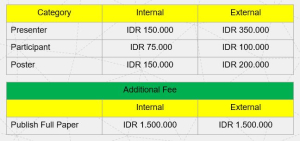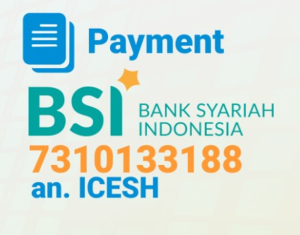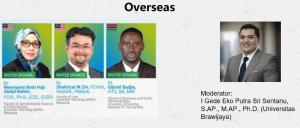Tema ICESH 2025
Sustainable Development Goals : The Intersection of Economic Policies and Environmental Law
Topic ICESH 2025
The topics covered at this conference will include two main fields: Economics and Law, as follows:
Management Field:
- Sustainable Supply Chain Management: Best Practices
- Business Innovations for a Circular Economy: Models and Strategies
- Sustainable Leadership: Inspiring Change
- Data and Technology for Sustainability: Current Trends
- Collaborative Economy: Building Partnerships for SDGs
- Sustainability Reports: Transparency and Accountability for SDGs
- Digital Transformation in Sustainability Management
- Stakeholder Engagement in Environmental Decision-Making Processes
- Green Marketing: Changing Consumer Perceptions for Sustainability
- Sustainable Innovation Management: Creating Value in Business
Accounting Field:
- Sustainable Financial Reporting: Integrating ESG Metrics
- The Role of Accountants in Promoting Sustainable Business Practices
- Impact of Climate Change on Financial Risk Assessment
- Green Accounting: Measuring Environmental Costs and Benefits
- Sustainability Audits: Ensuring Compliance with Environmental Standards
- The Future of Accounting: Technology and Sustainability Integration
- Reporting on Social Impact: The New Frontier for Accountants
- Taxation and Sustainability: Exploring Green Tax Incentives
- Accountability in Sustainability Reporting: Challenges and Best Practices
- The Influence of Corporate Governance on Sustainable Financial Practices
Legal Field:
- Environmental Law and Climate Change: Global Responsibilities
- Legal Protection for Biodiversity in the Modern Era
- Green Regulations in International Trade Policies
- Sustainability and Human Rights: Legal Integration
- Legal Innovations for Renewable Energy: Challenges and Solutions
- Corporate Legal Responsibilities in the Context of Climate Change
- Environmental Licensing: Processes and Challenges in the Digital Era
- International Agreements on Plastic Pollution: Towards Global Solutions
- Social Justice in Renewable Energy Regulation
- Natural Resource Conservation Law: From Theory to Practice
Timeline ICESH 2025
- Payment (paper & poster) : 30 June 2025
- Abstract Deadline : 1 July 2025
- Full Paper/poster Deadline : 10 July 2025
- Registration Deadline (paper &poster) :10 July 2025
Organizing Committee ICESH 2025
Advisory Board
Rector : Dr. H. Muhammad Kadafi, S.H., M.H.
Vice Rector I : Prof. Dr. Dessy Hermawan, S.Kep., NS., M.Kes.
Vice Rector II : Drs. Nirwanto, M.Kes.
Vice Rector III : Dr.Eng Rina Febrina, ST., MT.
Vice Rector IV : Drs. Suharman, M.Pd., M.Kes.
Head of LPPM : Prof. Erna Listyaningsih, SE, M.Si., Ph.D.
Person in Charge:
Dean of the Faculty of Economics and Management : Dr. (CAN). Aditia Arief Firmanto, SH., MH.
Dean of the Faculty of Law: Dr. Rahyono, S.Sos., MM.
Chairperson: Dr. Febrianty, S.E., M.Si.
Vice Chair 1: Rissa Afni Martinouva, S.H., M.H.
Vice Chair 2: Muhammad Lutfi, S.E., M.Si.
Secretary: Dwi Arassy Aprillia RS, S.H., M.H.
Treasurer: Ayu Nursari, S.E., M.E.
Chief of Event & Speaker Coordinator : Hamidah Nur Rahmawati, M.Pd.
Chief of Secretariat & Public Relations Division : Euis Mufahamah, S.E., M.Ak.
Chief of Catering : Lestari Wuryanti, S.E., M.M.
Chief of Equipment and Decoration : Amril Samosir, S.Kom., M.T.I.
Chief of Public Document : Hiro Sejati, S.E., M.M.
Chief of Sponsorship & Co-host : Indah Lia Puspita, S.E., M.Si.
Chief of Journal Publication and Presentation : Hardini Ariningrum, S.E., M.Ak., CFRS.
Reviewer The 2nd ICESH 2025
Reviewers of Articles and Presenters during the Presentation Session:
- Prof. Erna Listyaningsih, S.E., M.Si., Ph.D., A.F.A. (Universitas Malahayati)
- Prof. Yuliansyah, M.S.A., Ph.D., Akt., CA. (Universitas Lampung)
- Prof. Dr. Nunung Rodliyah, M.A. (Universitas Lampung)
- Assoc Prof. Dr. Fajar Gustiawaty Dewi, S.E., M.Si., Akt. (Universitas Lampung)
- I Gede Eko Putra Sri Sentanu, S.AP., M.AP., Ph.D. (Universitas Brawijaya)
- Dr. Sari Lestari Zainal Ridho, SE, M.Ec, CHE. (Politeknik Negeri Sriwijaya)
- Dr. Gatot Sugiharto, S.H., M.H. (Universitas Ahmad Dahlan)
- Dr. Febrianty, S.E., M.Si. (Universitas Malahayati)
- Dr. (CAN). Aditia Arief Firmanto, SH., MH. (Universitas Malahayati)
Poster Reviewer and Evaluator for the Poster Presentation Session:
- Muhammad Lutfi, SE., M. Si. (Universitas Malahayati) —> Poster
- Dr. (CAN). Rissa Afni Martinouva, SH., MH. (Universitas Malahayati) —> Poster
- Hardini Ariningrum, S.E., M.Ak., CFRS (Universitas Malahayati) –> Poster
- Reza Hardian Pratama.,S.E.,M.M. (Universitas Malahayati) —-> Poster
FEE CONFERENCE DAN PUBLIKASI ICESH 2025

FEE CONFERENCE AND PUBLICATION ICESH 2025


PLENARY SPEAKERS ICESH 2025

PLENARY SPEAKERS ICESH 2025

Point of Contact:
Regarding papers and posters
- Hardini Ariningrum, S.E., M.Ak., CFRS. (0813-7950-6946)
- Reza Hardian Pratama.,S.E.,M.M. (0812-7190-0891)
- Mulyani, S.E., M.Ak.(0821-3334-1040)
Regarding the event
- Dr. Febrianty, S.E., M.Si. (0812-6305-6906)
- Euis Mufahamah, S.E., M.Ak. (0897-4161-604)
Publication Ethics
- This Conference follows the guidelines set out by the Committee on Publication Ethics (COPE) in all aspects of publication ethics, in particular, protocols of research and publication misconduct.
- Author(s)
- Authors attest that the material has not been previously published and that they have not transferred any rights to the article to another party.
- Authors should ensure the originality of their work and must properly cite others work in accordance with the approved references format.
- Authors should not engage in plagiarism or self-plagiarism.
- Authors should ensure that they follow the criteria for authorship as described in the Committee on Publication Ethics (COPE).
- The authors must not disclose any personal information that may identify their subjects, such as overt descriptions, photographs or pedigrees. If photographs are essential to the article, the authors must receive written consent and state it clearly within the article.
- Authors should make all data and details of their work available to the editors if there are suspicions of data falsification or fabrication.
- Authors of the article should clarify any possible conflicts of interest such as their job role, research expenses, consultant expenses, and intellectual property.
Read more into : https://publicationethics.org/resources/guidelines



